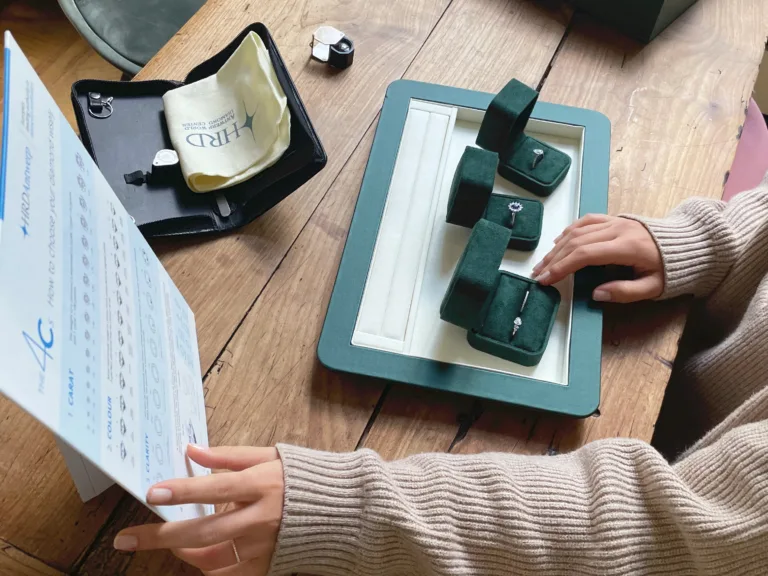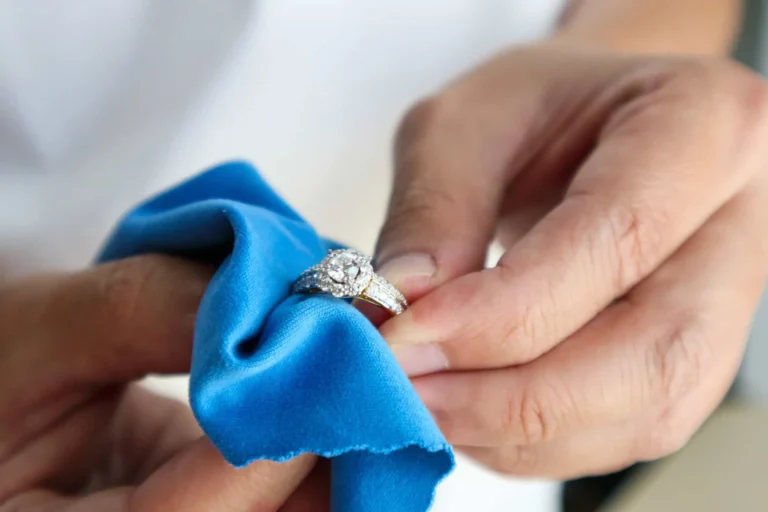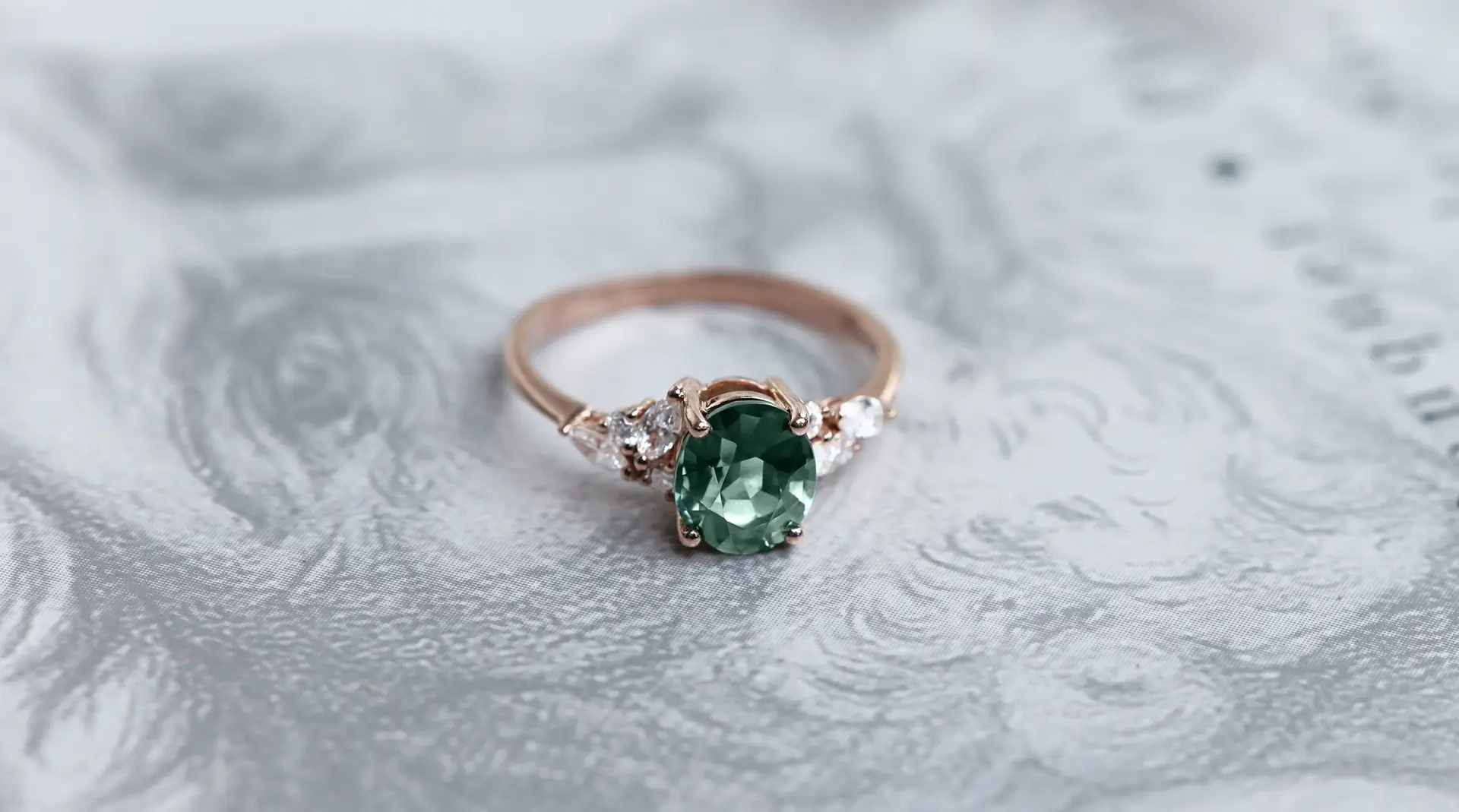
Minimaliste ou baroque ? Trouver son style joaillier en 5 questions
Politains – Joaillerie sur-mesure à Paris & Zurich Chaque bijou est une expression. Une manière
Emeralds, with their captivating green brilliance, are among the most sought-after gemstones in the world. However, their rarity and value also make them prime targets for counterfeits or imitations. Knowing how to recognize a real emerald is therefore essential, whether you are a jewelry enthusiast or seeking a unique piece for a special occasion. This article guides you through the key criteria for identifying a genuine emerald in jewelry.
One of the most distinctive features of an emerald is its color. A real emerald displays a rich and vibrant green, often described as deep and intense. This hue comes from traces of chromium, vanadium, or iron in its chemical composition.
Hue: A real emerald generally has an evenly distributed color, with shades ranging from pure green to green with slightly bluish reflections.
Saturation: Real emeralds have rich, vibrant saturation. If the stone looks dull or excessively bright (without subtle variations), it may be an imitation.
Luster: A genuine emerald may have a soft brilliance, but not an overly reflective surface like synthetic glass or imitations.
Unlike diamonds, where the absence of inclusions is highly valued, emeralds are often appreciated for their natural inclusions. Sometimes called the “garden” of the emerald, these internal imperfections add character to the stone.
Appearance of inclusions: In a real emerald, inclusions can appear as fine fractures, bubbles, or network-like patterns. These features are visible to the naked eye or with a loupe, but should not compromise durability.
Lack of perfect clarity: If the stone is completely clear with no inclusions, it could be a synthetic emerald or a glass imitation.
A genuine emerald has unique optical properties that distinguish it from counterfeits.
Reflection test: A real emerald reflects light softly and diffusely. If you see overly bright flashes or rainbow reflections inside the stone, it may be colored glass or green quartz.
Natural brilliance: Unlike imitations, a real emerald never looks “too perfect.” It combines natural variations in hue and brilliance, which enhance its charm.
Real emeralds rank 7.5–8 on the Mohs hardness scale, meaning they are relatively hard but not as resistant as diamonds. This feature can be tested with caution.
Scratches: A real emerald will not scratch easily with a blade or metal object. However, avoid aggressive tests to prevent damage.
Vulnerability to impacts: Though durable, emeralds are more fragile due to their natural inclusions, making them slightly sensitive to cracks upon impact.
Authentic emeralds are generally lighter than glass or plastic imitations. A density test performed by a jeweler can help confirm composition. Synthetic emeralds or glass imitations often have a higher or abnormal density compared to natural emeralds.
To be certain you are buying a real emerald, it is crucial to request a certificate of authenticity. Gemological laboratories such as GIA (Gemological Institute of America) or SSEF provide detailed reports on the origin and characteristics of the stone.
Possible treatments: Most natural emeralds are treated with oil to improve clarity. This practice is common and does not affect authenticity, but it is important to know.
Geographic origin: Certification may also state the emerald’s origin (Colombia, Zambia, Brazil, etc.), which can influence its value.
If you have doubts about the authenticity of an emerald in jewelry, it is always best to consult a jeweler or gemologist. A professional can examine the stone with specialized tools such as a microscope or spectroscope to confirm its nature.
At Politains, we offer only authentic emerald jewelry, carefully selected and accompanied by certificates of authenticity. Whether you are seeking an emerald ring, pendant, or earrings, you can be assured of the quality and authenticity of each piece.
Recognizing a real emerald in jewelry requires careful attention to its unique characteristics, including color, inclusions, and brilliance. While some imitations may be convincing, they cannot match the depth, glow, and character of a natural emerald. By combining your own observations with the expertise of a trusted jeweler, you can ensure that your emerald jewelry is as authentic as it is beautiful.
Ready to discover the timeless elegance of authentic emerald jewelry? Explore Politains’ exclusive collection, where each piece is designed to capture the magic and beauty of this legendary gemstone.

Politains – Joaillerie sur-mesure à Paris & Zurich Chaque bijou est une expression. Une manière

Politains – Joaillerie sur-mesure à Paris & Zurich Le platine est l’un des métaux les

